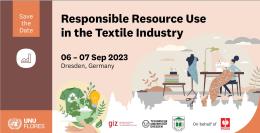On 1 September 2022, UNU-IAS contributed to a side event titled “Knowledge and Innovation: Investment for a new Africa” at the Eighth Tokyo International Conference on African Development (TICAD8). It focused on research collaboration between Africa and Japan, and potential partnerships for science, technology, and investment in water, energy, material sciences, biotechnology, health, and ICT.
The side event reflected the outcomes of a two-day preparation meeting that took place on 24–25 August 2022.
Opening the event, Salah Hannachi (Steering Committee President, AFrica-JApan Symposium on Society, Science and Technology, AFJASST) discussed lessons learned from the COVID-19 pandemic for Africa’s development, and highlighted the importance of innovation and research from a social and economic perspective. Aboubaker Chedikh Beye (Steering Committee Vice-President, AFJASST) noted the need to create an enabling environment for research and technology transfer on the continent. Adel Mnif (General Coordinator, Organising Committee, AFJASST) introduced the objectives of AFJASST, a new platform of public, academic, research, and industrial institutions contributing to the sustainable development of Africa.
The event featured four panel discussions, each examining investment in knowledge and innovation for a new Africa from a different angle.
The first panel discussed strategies for technology transfer, innovation, and opportunities to develop the Japan–Africa partnership. Neila Nouira Gongi (Minister of Industry, Mines, and Energy, Tunisia) noted that the side event constituted one of the highlights of TICAD8 and emphasised the potential for collaboration between Japanese companies, African startups, and the continent’s infrastructure.
Akio Takemoto (Programme Head, UNU-IAS) delivered a keynote speech on the importance of synergies between climate change action and the SDGs to ensure the future sustainable development of the continent. Noting that Africa’s population and economic growth would significantly increase by 2030, he stressed the key role of climate finance and renewable energy in meeting future energy needs while striving to achieve the goals of Paris Agreement on climate change. He highlighted the opportunity for investment in clean energy projects, as well as the potential of a carbon credit mechanism for the continent. He called for capacity building to enhance synergies between climate action and the SDGs, as well as institutional capacity building for implementing policy agreements.
The second panel discussed water, energy, and material sciences for sustainable development in Africa. Ahmed Ghrabi (Director General, Water Research and Technologies Centre, CERTE, Tunisia) underlined the crucial role of research and cooperation between Japan and Africa to bring sustainable solutions for water challenges on the African continent.
Taikan Oki (Professor, University of Tokyo; former Senior Vice-Rector, UNU) delivered a keynote speech on water, climate, and sustainable development in Africa. He presented lessons from the water target of the Millennium Development Goals and stressed that social development would enhance water security in future. He explained that the exchange of knowledge and technology through global partnerships based on multilateralism was critical for implementing efficient climate change adaptation measures, in addition to adequate investments.
A third panel discussed biotechnology, health, food, agriculture, and ICT. Hichem Ben Salem (Executive Director, Institution of Agricultural Research and Higher Education, IRESA) acknowledged the ongoing efforts to implement technology transfer in Africa, noting that there was room for improvement.
Focusing on Japanese agriculture, Kensuke Fukushi (Academic Programme Advisor, UNU-IAS) introduced a new marketing mechanism connecting farmers and consumers through ICT, which allows small-scale farmers to survive and consumers to buy the exact amount of food needed, reducing food waste. The mechanism could be the subject of collaboration between Japan and Tunisia. He announced the publication of a new report summarising the outcomes of the Water for Sustainable Development research project implemented by UNU-IAS.
The fourth panel discussed personalised medicine, genetic engineering, and nano arts, and the challenges and opportunities they represented for small and medium-sized enterprises and startups in Africa.



